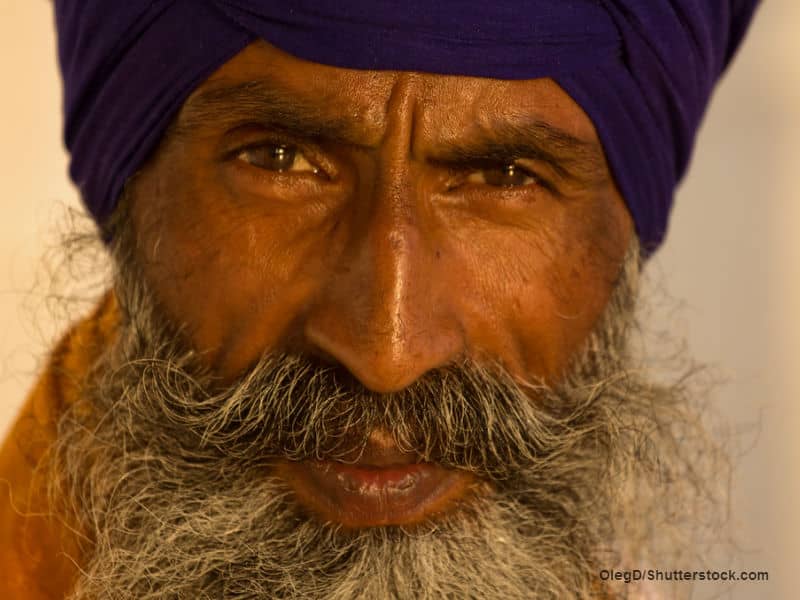EULESS, September 24--His is the most hated face in America.
On television screens, photographs and wanted posters, the image of Osama bin Laden, with a dark beard and wearing a turban, has provoked revulsion and fear.
Among some Americans, that image has also served as an excuse to hurt innocents, including American Sikhs who wear turbans and beards as articles of a separate faith.
Sikh garb bears a superficial resemblance to bin Laden's, and that likeness has become dangerous since the terrorist attacks in New York and near Washington, D.C., Sikh community leaders in the Metroplex say.
 Many Sikhs who live in Dallas and Tarrant counties say they fear attacks by their neighbors. They stay in their homes, only go out in groups and try not to travel after dark. They fear the fate that befell a Sikh man in Arizona, who was killed solely because of his appearance, according to police there.
Many Sikhs who live in Dallas and Tarrant counties say they fear attacks by their neighbors. They stay in their homes, only go out in groups and try not to travel after dark. They fear the fate that befell a Sikh man in Arizona, who was killed solely because of his appearance, according to police there.Manmohan Singh Chima of Plano says he was filled with horror at last week's attacks. Now he is concerned for his family and worried that America's future as a haven of freedom is at stake.
"The images in the media say, 'Hey, these are the bad guys,' " Chima said. "If we allow the terrorists to create a division amongst us ... it can lead to instability within the country. Our borders need to be secure, and our citizens need to be able to express themselves and live up to the ideal of American culture."
Sikhs say they have been especially guarded since a gunman drove into a Chevron station in Mesa, Ariz., and shot to death the owner, Balbir Singh Sodhi. The gunman fired at a Lebanese clerk and then shot into the home of an Afghan family, police say.
As the suspect, Frank S. Roque, was arrested, he called himself "a patriot," The New York Times reported. He is charged with murder, two counts of attempted homicide and three counts of drive-by shooting.
In Dallas, police are investigating the death of Waqar Hasan, a 46- year-old Pakistani Muslim who was part owner of Mom's Grocery Store in the 10000 block of Elam Road. In Irving last week, a mosque was riddled with bullets. In Denton, a mosque was firebombed.
FBI Special Agent in Charge Danny Defenbaugh has said he's disgusted by the attacks, which tie up agents who might otherwise pursue leads in the wider terror investigation.
 For Sikhs who worship in the Gurdwara Sikh Sangat, or temple, in Euless, personal attacks based on religion and appearance represent the kind of oppression that Americans have opposed all around the world.
For Sikhs who worship in the Gurdwara Sikh Sangat, or temple, in Euless, personal attacks based on religion and appearance represent the kind of oppression that Americans have opposed all around the world.Chima, who always wears a turban, said his car was pelted with stones during a recent trip to North Carolina. Such "seeds of hate" have been spread by the attacks on New York and near Washington, D.C., he said.
"We have failed if we ... don't feel safe where we are," he said.
Gurvendra Singh Suri, a Sikh who lives in Valley Ranch and worships at the Euless gurdwara, said he wants the violence and the hate to stop.
"I think it's ignorance from the perspective that Sikh-Americans are not associated with Taliban groups," Suri said. "This [the attacks] was not done by any religion; it was done by terrorists."
Suri said about 100 Sikhs practice at the gurdwara in Euless.
Sikhism, founded in Punjab, a state in northern India, has about 20 million followers worldwide and 500,000 in the United States. Adherents believe in one God, the same creator revered by Christians, Muslims and other faiths, Suri said.
Sikh beliefs are concerned foremost with equality. Their religion rejects India's caste system, and some Sikhs carry a small, symbolic knife called a kapan as a reminder that they must always fight oppression.
They never cut their hair--the reason for the turban--because hair is considered a gift from God and a representation of the saintliness to which they strive.
Men, women and children also wear a steel band on their wrists, called karra, to dissuade them from bad deeds because most bad deeds, Suri said, are committed by the hand.
Amrit Kaur Anand said it is unfortunate that people are being judged by their appearance rather than their merits.
"My kids were born here and are citizens from this country, and I'm a naturalized citizen," said Anand, who lives in Fort Worth and came to the United States 30 years ago.
"Our children should not be targeted for this."

